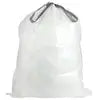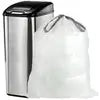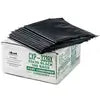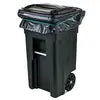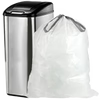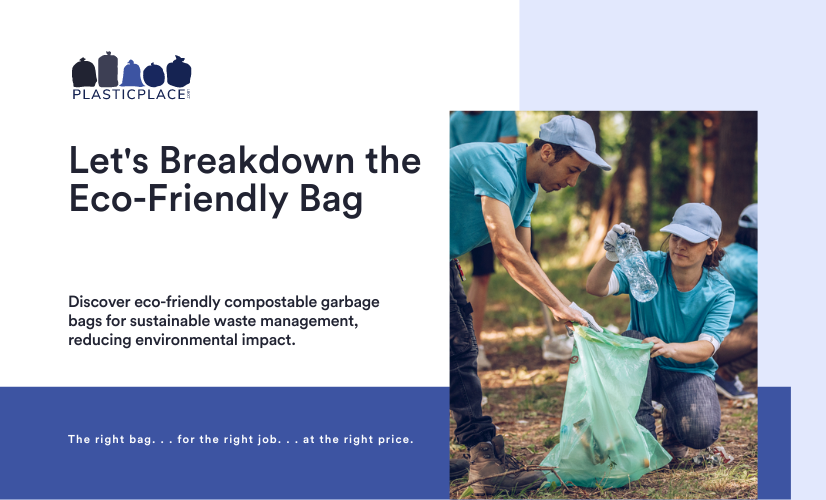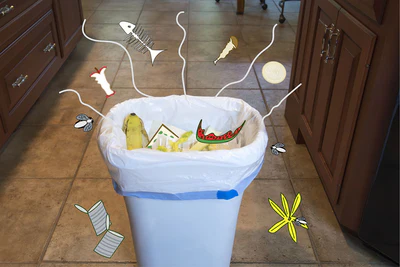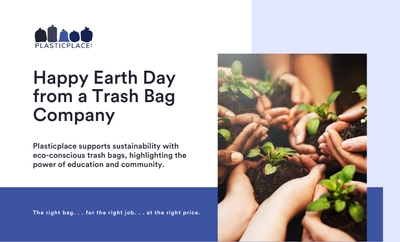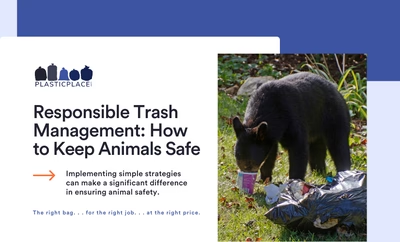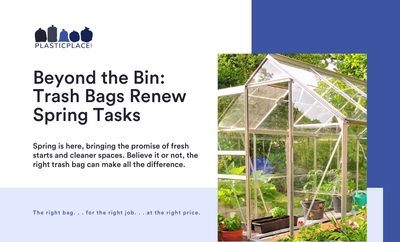“When you know better, you do better” is the perfect saying to remember as spring rolls in. The season brings a fresh sense of renewal and care for our surroundings, and it's the perfect time to think about how we can do better for our planet, even when it comes to something as simple as tossing out the trash. While the plastic garbage bag is often the best choice, understanding the benefits of eco-friendly and compostable alternatives can empower us to lessen our environmental impact.
Exploring these greener options shows that making a switch, even partially, during our spring clean-ups and daily routines can significantly reduce the load we place on our planet. It's about taking informed steps towards sustainability, ensuring that as we clear out the old, we're also nurturing a fresh, vibrant world for the coming seasons.
What’s the Difference?
Eco-friendly and compostable bags serve similar purposes but differ in materials, disposal, and environmental impact. Eco-friendly bags are crafted from recycled materials or sustainable resources to lessen their impact on the environment both during their production and after you're done using them. Depending on their material composition, the bags can be reused and are typically more versatile in disposal options, including traditional and recycling bins.
On the flip side, compostable bags are the targeted solution for organic waste. Created to break down into natural compost under the right conditions, such as those found in commercial composting facilities, they require specific environments to degrade fully. These bags are ideal for households and businesses with access to composting options, allowing them to transform organic waste into nutrient-rich soil, thereby reducing landfill waste.
Eco-Friendly Bag Breakdown
Eco-friendly garbage bags are designed to reduce environmental impact through their materials and manufacturing process. Unlike traditional plastic bags, these are made from sustainable resources such as recycled materials, biodegradable polymers, or plant-based substances like cornstarch. These components allow the bags to break down quickly and cleanly, minimizing pollution and waste in landfills and natural habitats. Eco-friendly bags offer a practical solution for waste disposal while supporting efforts to protect the planet and reduce the carbon footprint associated with traditional waste management practices. Here's why making the switch is worth considering:
Benefits
- Reduces Plastic Waste: Significantly reduces plastic ending up in landfills and oceans.
- Sustainable Lifecycle: Promotes a greener cycle of use and disposal, aiding global efforts to combat pollution.
- Conserves Resources: Supports the conservation of natural resources by utilizing recycled or biodegradable materials.
Limitations
- Higher Costs: This may be pricier due to the costlier eco-friendly production processes.
- Specific Biodegradation Conditions: Requires particular conditions to break down effectively, which might not always be available.
Trash Bags to Try
We have the perfect solution for keeping your kitchen and business spaces clean and smelling fresh with our eco-friendly black trash bags. These bags are designed for your needs and blend strength, size, and environmental consciousness.
- The Bag: 12-16 Gallon Eco-Friendly Trash Bags
- Odor Control: Specially designed to inhibit the growth of odor-causing bacteria, ensuring your kitchen smells fresh.
- Durable Design: Features a solid gusset to prevent splitting and leaking, even with food scraps.
- The Bag: 55 Gallon Eco-Friendly Trash Bags
- Eco-Friendly: Made from the finest post-consumer recycled materials, offering a greener trash solution.
- Extra Strong & Large: Boasts the thickness equivalent of 1.7 mil low-density plastic in a generous 55-gallon size, perfect for commercial kitchens, warehouses, and outdoor uses.
Understanding Compostable Garbage Bags
Compostable garbage bags decompose into harmless natural elements in a compost setting, contrasting traditional plastic bags that linger in the environment for centuries. These bags are engineered to break down efficiently in the presence of microorganisms, moisture, and oxygen, usually within 90 to 180 days, because they are made of renewable resources like corn starch, potato starch, and other plant-based materials.
This decomposition process enriches the soil without leaving any toxic residues, showcasing compostable bags as a sustainable choice that reduces reliance on conventional plastics and contributes to a cleaner, healthier planet.
Environmental Benefits
- Reduces Plastic Waste: Lessens the volume of plastic in landfills and oceans.
- Supports a Healthier Planet: Contributes to environmental conservation by using materials that break down naturally.
Challenges to Navigate
- Composting Access: Effective decomposition requires access to appropriate composting facilities.
- Higher Costs: They are generally more expensive than traditional plastic bags, but not by much. See how they compare here.
Compostable Bag for a Greener Clean
Our bags are crafted to strike the perfect balance between reducing our ecological footprint and maintaining high performance. Suitable for household and commercial settings, they fuse together sustainability and durability.
Plasticplace’s bags set the standard:
- Bio-Star Seal: Our trash can liners are fully biodegradable and comply with the ASTM D6400 standards for compostable plastics, making them suitable for commercial composting facilities.
- Commercial Composting Compatibility: Designed for industrial composting facilities, these bags are a no-go for backyard composting but shine in more extensive, controlled environments.
- Leak-Proof Assurance: With a star seal, these bags prevent leaks, making composting clean and hassle-free.
- Durability Meets Eco-Consciousness: Crafted from superior post-consumer recycled materials, and these extra-strong bags support environmental goals and heavy-duty use.
- Capacity for Every Need: Our product range includes bags from 12 to 60-gallon volumes, making them an excellent choice for commercial, kitchen, warehouse, or outdoor use, whatever your needs may be.
Choosing the right garbage bag for your needs doesn't have to be complicated. Whether your priorities align with environmental goals, adapting to specific waste disposal methods, or making the most of local composting facilities, Plasticplace is here to guide you. We're proud to have environmental policies in place and partner with manufacturers committed to reducing their environmental impact, following the EPA’s best practices and the 4-R principle: Reduce, Reuse, Recycle, and Reclaim.
Our dedication is reflected in both our products and services. From bags made with over 90% recycled materials to ensuring our offerings are recyclable at local facilities. If you're pondering which bag fits your home or project best or have any other questions, don't hesitate to reach out. Our customer service team is happy to assist, ensuring you find the perfect match for your environmental ambitions and practical needs.
Key Takeaways:
- Eco-Friendly vs. Compostable Bags: Highlights the distinctions between bags made from sustainable resources and those that can biodegrade in specific conditions, serving as eco-conscious alternatives to traditional plastic.
- Benefits and Limitations: Discusses the environmental benefits of both bags, such as reducing plastic waste, and the challenges they face, including cost and the need for access to composting facilities.
- Choosing the Right Bag: Offers advice on selecting the appropriate eco-friendly or compostable bag based on environmental goals and practical needs, emphasizing Plasticplace's dedication to reducing environmental impact.
 4.9 out of 5
4.9 out of 5  Mix & Match: Buy any two products for 10% off!
Mix & Match: Buy any two products for 10% off!













